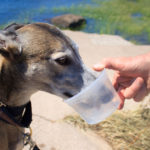 We sometimes take for granted the availability and cleanliness of our water, but in other parts of the world water is unavailable due to drought or is not clean enough to drink. The following are tips to help you ensure the safety of your pets and their drinking water.
We sometimes take for granted the availability and cleanliness of our water, but in other parts of the world water is unavailable due to drought or is not clean enough to drink. The following are tips to help you ensure the safety of your pets and their drinking water.
Biofilm
Your pets deserve clean water too. Clean water will not only hydrate your pets, but also prevent digestive upset. Have you ever emptied your pup’s waterbowl and found that awful slimy residue? It’s called biofilm and can negatively affect your pet’s health.
Biofilm can contribute the following infections affecting dogs and cats (1) :
· Enteritis
· Periodontal Disease
· Urinary Tract Infections
Clean your pet’s food and waterbowl daily. Give them fresh water everyday. Fountains help to aerate the water and both cats and dogs enjoy drinking from a fountain – but the fountains need to be cleaned and the water changed daily.
Going on a trip?
Give your pet bottled water or bring water from home to prevent digestive upset. Water quality can change from city to city, and if your pup isn’t acclimated, it can cause an imbalance – not something either of you want while on vacation.
Avoid Communal Water Bowls
Many town centers offer communal water bowls for visiting pets to enjoy. Communal water bowls can increase the risk of Canine Papilloma Virus, Kennel Cough and respiratory infections, including Canine Influenza. Center for Pet Safety recommends pet owners bring fresh bottled water for your pet to ensure an ample supply of clean water during your outing and avoid using communal water bowls.
Blue Green Algae (BGA) is Deadly
During summer months certain algae can be extremely toxic to pets. Blue Green Algae is a cyanobacteria (2) that can kill with a small amount of exposure. The toxins can also be absorbed through the skin so it is imperative for people and pets to avoid water that smells bad, has a scum or any algae floating on the surface.
· Keep your pup leashed and prevent him from investigating nearby ponds or streams.
· Do not let your pet drink from any open water source (lake, pond, stream).
· If exposed to algae, rinse the dog off immediately with fresh tap water. Follow up to rinse off any family member that has come in contact with the algae.
· When in doubt, contact your veterinarian/family doctor for additional guidance if exposure is suspected. Better safe than sorry!
At Center for Pet Safety, we are thankful for fresh, clean water.
(Source1: https://www.ncbi.nlm.nih.gov/pmc/articles/PMC4819343/)
(Source2: https://www.epa.gov/nutrientpollution/harmful-algal-blooms)

Comments are closed.